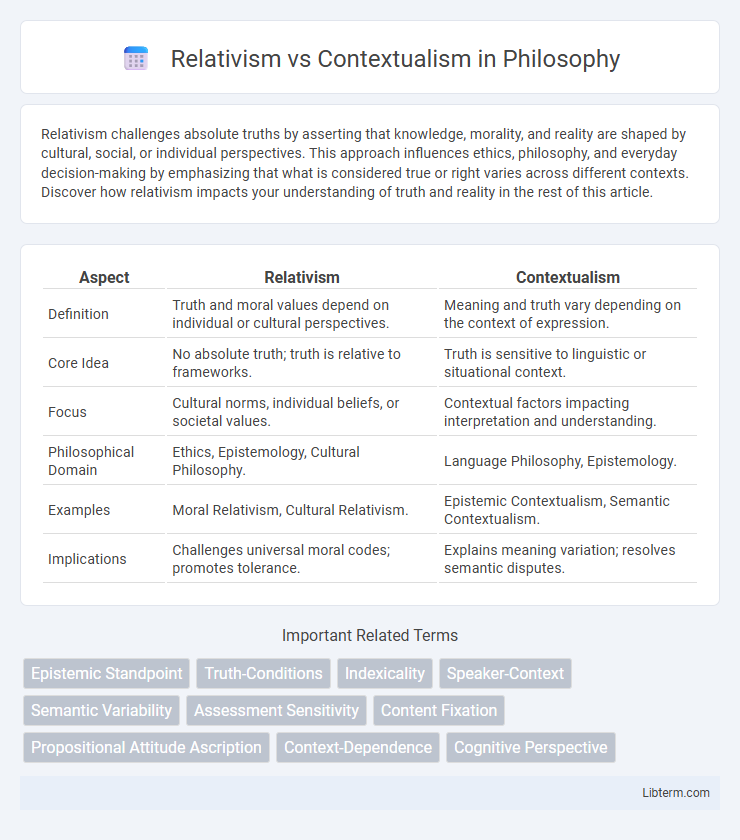Relativism challenges absolute truths by asserting that knowledge, morality, and reality are shaped by cultural, social, or individual perspectives. This approach influences ethics, philosophy, and everyday decision-making by emphasizing that what is considered true or right varies across different contexts. Discover how relativism impacts your understanding of truth and reality in the rest of this article.
Table of Comparison
| Aspect | Relativism | Contextualism |
|---|---|---|
| Definition | Truth and moral values depend on individual or cultural perspectives. | Meaning and truth vary depending on the context of expression. |
| Core Idea | No absolute truth; truth is relative to frameworks. | Truth is sensitive to linguistic or situational context. |
| Focus | Cultural norms, individual beliefs, or societal values. | Contextual factors impacting interpretation and understanding. |
| Philosophical Domain | Ethics, Epistemology, Cultural Philosophy. | Language Philosophy, Epistemology. |
| Examples | Moral Relativism, Cultural Relativism. | Epistemic Contextualism, Semantic Contextualism. |
| Implications | Challenges universal moral codes; promotes tolerance. | Explains meaning variation; resolves semantic disputes. |
Introduction to Relativism and Contextualism
Relativism asserts that truth and moral values depend on cultural, historical, or personal perspectives, rejecting absolute standards. Contextualism emphasizes that the interpretation of statements or concepts relies on situational factors, such as speaker intention and surrounding circumstances. Both frameworks challenge fixed meanings, highlighting fluidity in understanding truth and meaning across different contexts.
Defining Relativism: Core Principles
Relativism asserts that truth and moral values depend on individual perspectives, cultural contexts, or historical periods rather than being absolute or universal. Core principles include the rejection of objective standards, emphasizing that knowledge and ethics vary across societies and situations. This approach challenges fixed interpretations by highlighting the significance of diverse viewpoints in assessing reality and morality.
Understanding Contextualism: Key Concepts
Contextualism emphasizes the role of context in determining the truth-conditions of statements, asserting that meaning varies based on factors such as speaker intentions, conversational background, and situational elements. This approach contrasts with relativism by proposing that truth is not absolute but contingent on the immediate linguistic and environmental context. Key concepts include indexicality, context-shifting parameters, and the dynamic adjustment of semantic content to account for variability in communication settings.
Historical Evolution of Relativism and Contextualism
Relativism emerged historically as a response to absolute truths, gaining prominence during the Enlightenment when thinkers challenged universal moral and epistemic standards. Contextualism developed later, particularly in the 20th century, influenced by linguistic philosophy and pragmatism, emphasizing the role of context in determining meaning and truth. The evolution of these theories reflects a shift from fixed universal principles toward flexible interpretations grounded in varying cultural, linguistic, and situational frameworks.
Relativism vs Contextualism: Key Differences
Relativism asserts that truth and moral values are not absolute but depend on individual or cultural perspectives, while Contextualism emphasizes the importance of situational context in interpreting statements or behaviors. Relativism treats truth as variable across different frameworks, whereas Contextualism holds that meaning and truth conditions can shift depending on context but within a structured semantic framework. Key differences lie in Relativism's broader epistemological stance versus Contextualism's focus on pragmatic and linguistic factors influencing interpretation.
Application in Epistemology
Relativism in epistemology asserts that truth and justification vary across cultures or frameworks, making knowledge claims dependent on particular perspectives. Contextualism maintains that the truth conditions of knowledge attributions shift based on the context of the speaker, emphasizing pragmatic factors in evaluating epistemic claims. Both approaches impact how epistemic justification is assessed, with relativism challenging universal standards and contextualism adapting standards according to situational variables.
Moral Relativism and Contextual Ethics
Moral relativism asserts that ethical truths depend on cultural or individual perspectives, rejecting universal moral standards. Contextual ethics emphasizes evaluating moral decisions based on specific situations, highlighting the influence of context on right and wrong actions. Both frameworks challenge absolute moral principles by prioritizing variability and situational factors in ethical judgment.
Linguistic Implications: Semantics and Pragmatics
Relativism in linguistics posits that the truth value of statements varies depending on the speaker's or listener's perspective, impacting semantic interpretation by allowing multiple, context-dependent meanings. Contextualism asserts that linguistic meaning is fixed but requires pragmatic context for full understanding, emphasizing how speakers use context to convey intended meanings. Both frameworks influence semantic theories by highlighting the interplay between literal meaning and pragmatic factors in communication.
Criticisms and Debates in Modern Philosophy
Relativism faces criticism for its potential to undermine objective truth by suggesting that all viewpoints are equally valid, leading to ethical and epistemological nihilism. Contextualism is debated for its reliance on shifting standards based on context, which some argue may introduce vagueness and inconsistency in knowledge claims. Modern philosophical discussions often center on whether contextualism provides a more flexible yet stable framework compared to the perceived radical subjectivity of relativism.
Conclusion: Future Directions and Implications
Future directions in the debate between relativism and contextualism increasingly emphasize the integration of pragmatic factors and cognitive science insights to resolve interpretative ambiguities. Exploring how cultural, linguistic, and situational contexts influence meaning could enhance semantic theories and improve applications in artificial intelligence and legal interpretation. The implications of this research may lead to more flexible semantic frameworks that accommodate variation without sacrificing clarity or communicative efficiency.
Relativism Infographic

 libterm.com
libterm.com